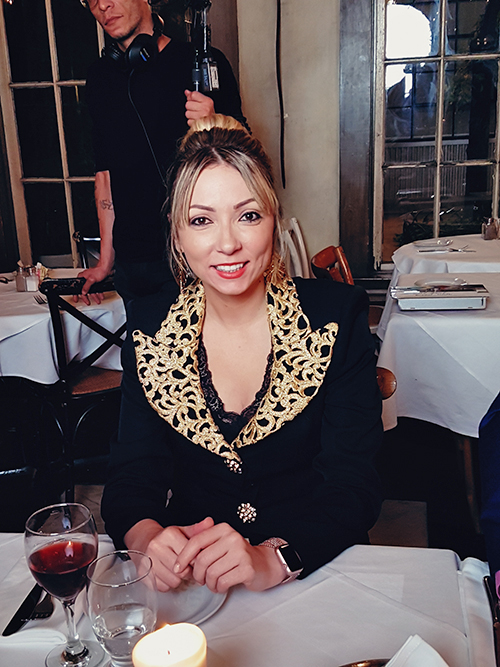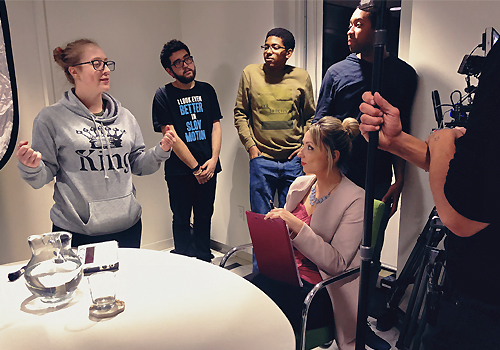COVID-19 has largely been a horror show for independent creators in media and entertainment, but Arts & Science alumna Emilia King (née Zboralska) is hoping to create a post-pandemic sequel with a happier storyline.
King is leading a “recovery cohort” at Ryerson University’s Transmedia Zone to advise and mentor artists and creators impacted by the pandemic, from fledgling podcasters and film makers to content entrepreneurs harnessing new social media technologies.
“We saw a really big opportunity to empower creators trying to rise up against the challenges presented by COVID,” says King, who earned her bachelor of arts with honours from UTM in 2009 and a master of arts in philosophy from U of T in 2010 before earning a PhD in communication and culture from Ryerson University in 2018.
“The idea behind the recovery cohort is to create a supportive space for people trying to reinvent and reimagine the creative industries for the moment, but also for the future,” she says.
King imagines a better and more equitable creative industry post-pandemic, with greater opportunities for startups and new creators, especially marginalized voices.
Statistics Canada estimated in 2019 the arts and cultural industry generated more than $53 billion in economic activity and nearly 20 million jobs. Before the pandemic hit, the Conference Board of Canada forecast the industry would contribute 15 per cent in GDP growth and eight per cent in employment growth between 2017 and 2026.
But the higher up you go in the media production sector of the industry, the fewer women and racialized people there are, says King.

King is trying to help change that. She is executive director and co-founder of a media production company called Pink Moon Studio and is a board member of the Independent Production Fund.
She was also the president of the Independent Web Creators of Canada before becoming co-director of engagement at the Creative Innovation Studio and manager of the Transmedia Zone, which counts several podcasts now on Canadian networks and a women-led multi-media business among its pre-pandemic successes.
“This pandemic is an exceptionally tumultuous time for emerging creators trying to get started in such an unstable and unpredictable world. It’s not like you’re going to be able to bump into another creator on the street and make a connection,” says King.
“What we're trying to do with the recovery cohort is to pivot our programming to create a virtual world that makes sense of the times we’re living in.”
King says the Transmedia Zone is reminiscent of her philosophy seminars at UTM, with small groups, one-on-one attention and personalized content.
“What I'm doing at the Transmedia Zone and Ryerson is trying to incubate really innovative content that is different from what we're seeing, and it's all about equity and putting people in stories that we're not seeing.”
Her own creative projects with Pink Moon include Making March, a podcast about a still at-large serial romance con artist who has stolen millions from unsuspecting women, and a film documentary about the roots of systemic anti-Black racism in Canada.
Her company is also in post-production on its first scripted feature. Lean Out is a semi-autobiographical coming-of-age movie that explores how two polar opposite PhD students navigate social norms, patriarchy, and prolonged adolescence as they approach their 30th birthdays.
King says the transition from studying philosophy to making films and podcasts was a logical step.
“I studied philosophy because I loved it and I truly think that experience set me up for what I'm doing today, which on the surface might seem completely unrelated, but actually is more related than anyone could imagine,” she says.

“I studied critical thinking in philosophy, and so much of the film business is about creative problem-solving. I can analyze problems in a very deep way. And much like in philosophy, my world centres around challenging the status quo.”
Her advice to undergrads is to follow their passions and don’t be in a rush to finish school.
“What you study should be something that expands your mind and gets you up every day, thinking in new ways. And you should also make room for extracurriculars,” says King, who was a reporter for a local television channel in Mississauga while she was an undergrad.
“Students are often preoccupied with finishing as soon as possible. But I would argue that if you are immersing yourself in as many experiences as possible, and your goal is to enrich your life, if you take five years instead of four, that’s fine.”
King is also feeling philosophical about the world after COVID.
“I know we're in a very dark place and we've seen careers and lives shattered but I know it's going to get better because I see the resiliency of creators and artists every day, and people reimagining a place that's far better than even before 2020.”
We’re celebrating International Women’s Day on March 8 by highlighting the groundbreaking contributions and unique stories of A&S women. All week, we’ll shine a spotlight on the vibrant women of our community.

